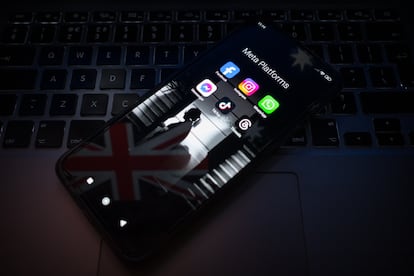Australia’s social media ban for children under 16: Understanding the world-first law
Platforms that do not comply with the new rule may face fines of more than $30 million


The Australian Senate approved a groundbreaking law on Thursday that will ban minors under 16 from accessing social media and impose fines of up to AU$49.5 million ($32.3 million) on platforms for systematic violations. The law, set to come into effect in 12 months, targets popular networks used by young people, including TikTok, Instagram, and Facebook. It passed the Senate with 34 votes in favor and 19 against, receiving support from some opposition members, just one day after being approved in the House of Representatives by a vote of 101-13. The bill will return to Congress for final approval, incorporating a series of amendments. Below are some key details of this new measure.
Why has the Australian government pushed for the new law?
Australian Prime Minister Anthony Albanese said last week that excessive use of social media poses a significant risk to the physical and mental health of children, particularly girls, citing harmful representations of body image and misogynistic content. “For too many young Australians, social media can be harmful. Almost two-thirds of 14- to 17-year-old Australians have viewed extremely harmful content online, including drug abuse, suicide or self-harm, as well as violent material,” said Communications Minister Michelle Rowland in Parliament.
What does the new law entail?
On Thursday, Senator Jenny McAllister, from the Australian Labour Party, explained that the government aims to ensure digital platforms — such as Meta (Instagram and Facebook), TikTok, X, Reddit, and Snapchat — take “reasonable measures” to prevent minors under 16 from opening or maintaining accounts on these platforms. Failure to comply could result in fines of up to $32.3 million. The law seeks to protect minors from bullying and mental health risks by introducing a category called “social media platforms with age restrictions,” which bans both the creation of new accounts and the maintenance of old ones for minors under 16. Notably, the law does not impose sanctions on users or parents who violate it. This is the highest age limit for social media access imposed by any country to date, and there will be no exemption for parental consent — minors under 16 cannot create accounts even with their parents’ approval. However, children will still be able to access “low-risk” platforms such as Google Classroom and YouTube.
How will Australia implement age verification?
Age verification has been one of the most controversial aspects of this legislation. Australia is the first country to raise the legal age for creating accounts to 16, but like in other countries, it does not yet have an age verification system. Tech companies have argued that developing a system that doesn’t infringe on user privacy is not viable, as personal documents will need to be reviewed to validate a user’s age. The government plans to test a system that may include biometric data or government-issued identification to verify users’ ages. Additionally, platforms that offer adult content, such as pornography, will be required to ensure users are of legal age before granting access.
What other countries have similar measures?
A notable precedent is the United Kingdom’s Online Safety Act, passed in October 2023. This law requires content providers to monitor the legality and suitability of material on social networks.
Why has the law faced opposition in Australia?
Some parties, such as the Green Party, have strongly opposed the proposal. David Shoebridge, a Green Party spokesperson in Parliament, described the law as “deeply flawed” and “dangerous,” arguing it would negatively affect vulnerable groups, including the LGBTQ+ community in rural areas, who often find support on social media. He also expressed concerns about the potential privacy violations for all users, including adults.
How have technology companies reacted?
Meta and X (formerly Twitter) have both requested more time to complete the age verification tests required by the Australian government, including biometric recognition. X issued a statement expressing “serious concerns” about the law’s legality and its compatibility with international human rights treaties. Elon Musk’s platform warned in a submission that the social media ban “will have a negative impact on the human rights of children and young people, including their rights to freedom of expression and access to information.”
Sign up for our weekly newsletter to get more English-language news coverage from EL PAÍS USA Edition
Tu suscripción se está usando en otro dispositivo
¿Quieres añadir otro usuario a tu suscripción?
Si continúas leyendo en este dispositivo, no se podrá leer en el otro.
FlechaTu suscripción se está usando en otro dispositivo y solo puedes acceder a EL PAÍS desde un dispositivo a la vez.
Si quieres compartir tu cuenta, cambia tu suscripción a la modalidad Premium, así podrás añadir otro usuario. Cada uno accederá con su propia cuenta de email, lo que os permitirá personalizar vuestra experiencia en EL PAÍS.
¿Tienes una suscripción de empresa? Accede aquí para contratar más cuentas.
En el caso de no saber quién está usando tu cuenta, te recomendamos cambiar tu contraseña aquí.
Si decides continuar compartiendo tu cuenta, este mensaje se mostrará en tu dispositivo y en el de la otra persona que está usando tu cuenta de forma indefinida, afectando a tu experiencia de lectura. Puedes consultar aquí los términos y condiciones de la suscripción digital.








































